
views
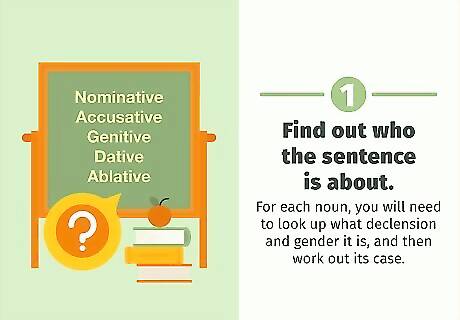
Find out who the sentence is about. In basic Latin there are five main cases: nominative(subject), accusative (object), genitive (possession), dative (to or for someone/something), or ablative (by, with or from someone/something). The nominative is the subject of the sentence, and the person or thing doing the action. For each noun, you will need to look up what declension and gender it is, and then work out its case.
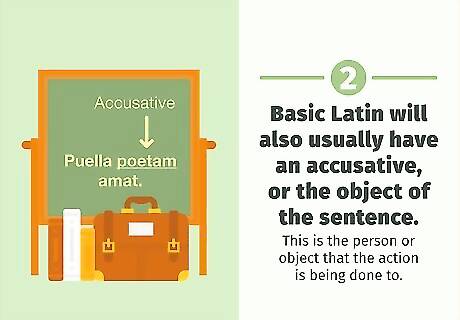
Basic Latin will also usually have an accusative, or the object of the sentence. This is the person or object that the action is being done to. For example, "puella poetam amat" Both puella and poetam belong to the 1st declension. The nominative singular ending for the first declension is -a, and the accusative singular ending is -am. This means that puella is nominative, poetam is accusative, and so the sentence reads "The girl loves the poet."
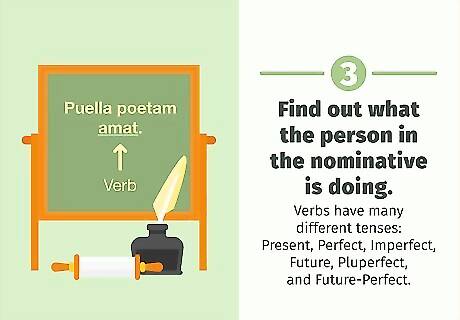
Find out what the person in the nominative is doing. For this you need to find the verb. Verbs have many different tenses, Present, Perfect, Imperfect, Future, Pluperfect, and Future-Perfect. Present tense is in the now(someone IS doing something). Perfect is past tense that is a completed action(someone HAS/HAVE done something). Imperfect is past tense of a verb that didn't finish(someone WAS doing something). Future is an action that will occur or hasn't occurred yet(someone WILL do something). Pluperfect tense is a form of past tense that occurred before another action (someone DID something BEFORE he/she did something ELSE). Future-perfect is an action that will happen in the future and be completed (someone WILL HAVE done something) (not used very often but still may come across it).. Verbs ending in "-o" "-s" "-t" "-mus" "-tis" "-nt" are usually in present tense. Verbs ending in "-bam" "-bas" "-bat" "-bamus" "-batis" "-bant" are usually in imperfect tense. "-i" "-is" "-it" "-imus" "-istis" "-erunt" are in the perfect tense. Verbs you are likely to come across are (in the infinitive [infinitive is the base form of a verb from which you get all, but the perfect pluperfect and future-perfect tenses from {translates just like English infinitives}]): Dicere: to say (like dire in French) Exire: to go out (like exit) Facere: to make/do (like faire in French) Narrare: to tell (like narrate) Portare: to carry (like transPORT) Rogare: to ask (like interROGate) Videre: to see (like video) Est: He/She is (irregular) Potest: He/She is able (irregular) Vult: He/She wants (irregular) Iit: He/She went (irregular)

Work out the other words. This is the hardest part, because this article can't explain all the nouns you are likely to come across. However, think about other European languages you know because there are many similarities. Take the context into account as well. A Latin dictionary would be very useful or you could do an Internet search for the many websites with vocabulary lists. Use the same principle of nominative and accusative.
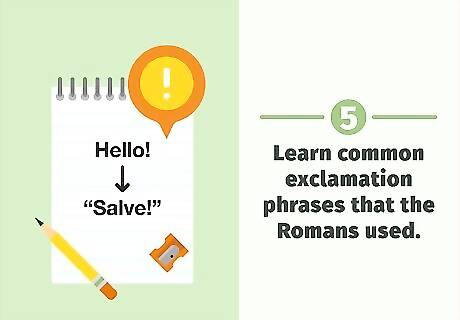
Learn common exclamation phrases that the Romans used. Salve: Hello Vale: Goodbye, farewell Vah!: Ugh! Tace!: Be silent! Nonne?: Surely? Minime: No Ita Vero: Yes Gratia: Thanks Cur?: Why?

Learn how to pronounce the Latin words.
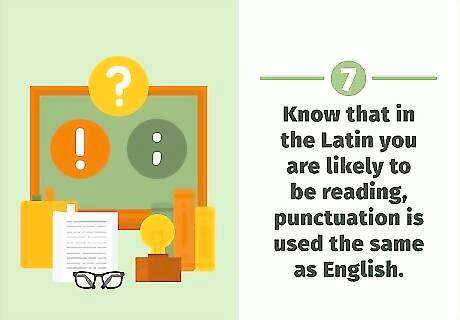
Know that in the Latin you are likely to be reading, punctuation is used the same as English. Some older Latin may have a few different rules on pronunciation. For example, a J will make a hard Y sound. Cs will always make their hard sound in older latin, like a K. They never sound like an S.

Practice. Look around for Latin classes if you're interested in it or look on the Internet for more information about the language.



















Comments
0 comment